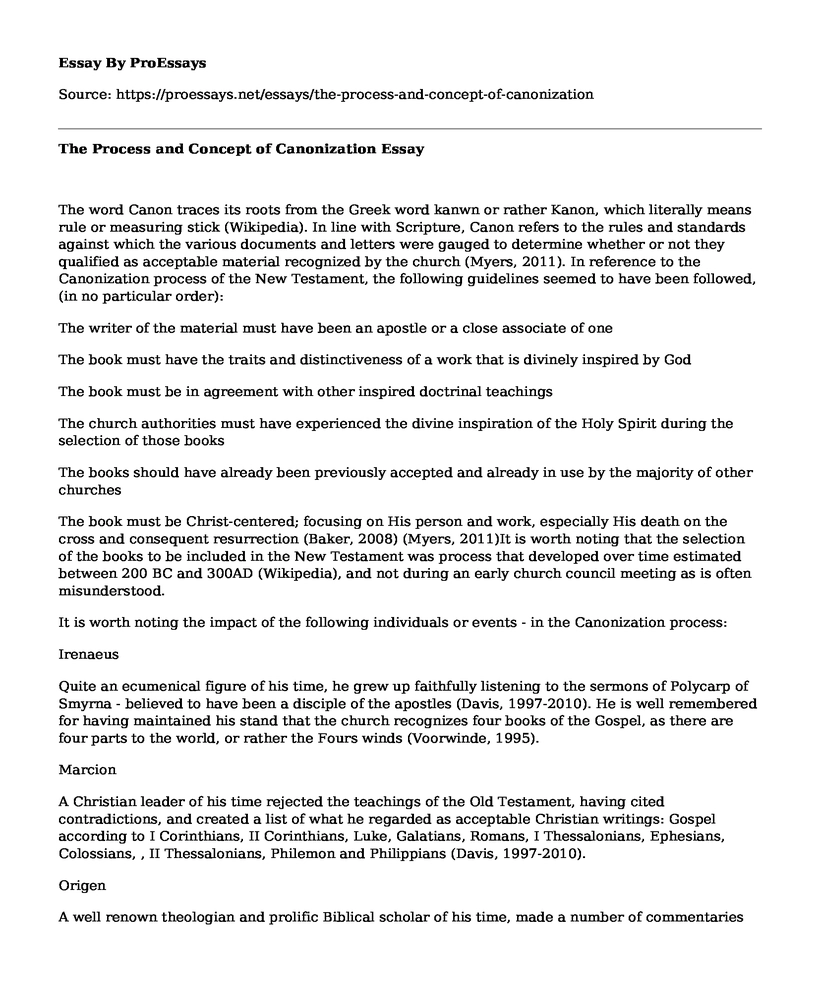The word Canon traces its roots from the Greek word kanwn or rather Kanon, which literally means rule or measuring stick (Wikipedia). In line with Scripture, Canon refers to the rules and standards against which the various documents and letters were gauged to determine whether or not they qualified as acceptable material recognized by the church (Myers, 2011). In reference to the Canonization process of the New Testament, the following guidelines seemed to have been followed, (in no particular order):
The writer of the material must have been an apostle or a close associate of one
The book must have the traits and distinctiveness of a work that is divinely inspired by God
The book must be in agreement with other inspired doctrinal teachings
The church authorities must have experienced the divine inspiration of the Holy Spirit during the selection of those books
The books should have already been previously accepted and already in use by the majority of other churches
The book must be Christ-centered; focusing on His person and work, especially His death on the cross and consequent resurrection (Baker, 2008) (Myers, 2011)It is worth noting that the selection of the books to be included in the New Testament was process that developed over time estimated between 200 BC and 300AD (Wikipedia), and not during an early church council meeting as is often misunderstood.
It is worth noting the impact of the following individuals or events - in the Canonization process:
Irenaeus
Quite an ecumenical figure of his time, he grew up faithfully listening to the sermons of Polycarp of Smyrna - believed to have been a disciple of the apostles (Davis, 1997-2010). He is well remembered for having maintained his stand that the church recognizes four books of the Gospel, as there are four parts to the world, or rather the Fours winds (Voorwinde, 1995).
Marcion
A Christian leader of his time rejected the teachings of the Old Testament, having cited contradictions, and created a list of what he regarded as acceptable Christian writings: Gospel according to I Corinthians, II Corinthians, Luke, Galatians, Romans, I Thessalonians, Ephesians, Colossians, , II Thessalonians, Philemon and Philippians (Davis, 1997-2010).
Origen
A well renown theologian and prolific Biblical scholar of his time, made a number of commentaries on some early Christian writings, some which have come down to us. These are: De Principiis, Commentary on the Gospel of Matthew, Homily on Luke, Commentary on the Gospel of John, Commentary on Romans, Homilies on Hebrews and Homilies on Joshua.
Synod of Hippo
This refers to one of a number of early church council meetings. This particular one which was held in 393 AD, is remembered as the first time in which a church council sat to rule on the approved list of inspired writings allowed to be read in the church (Baker, 2008). By this time though, many of these writings were already in use by majority of the early Christian churches.
God
Last but not least, the Bible rises and falls on God. In essence, it is His Word to us. God is the very reason there is even a discussion on the Canonization process or any other reference to Christianity. Focusing on the New Testament, had He not descended on earth to redeem us to Himself in the person of Jesus Christ, all the great scholars made reference to in the above research and also in other writings would have had nothing to write about. Inspiration by God was one of the criteria used in the Canonization process. All the apostles, renowned scholars and great theologians alike believe in the authority and supremacy of God, which inspires them to devote themselves to the works that they do.
References
Baker, R. A. (2008). How the New Testament Canon was Formed. The New Testament Canon, 10.
Davis, G. (1997-2010). Marcion, Origen. Retrieved from The Development of the Canon of the New Testament: http://www.ntcanon.org/authorities.shtml
Martinez, R. (2002). The Canon of the New Testament. Retrieved from Biblical Theology: http://www.biblicaltheology.com/Research/MartinezR01.html
Myers, J. (2011, August). The Canonization of Scripture (Seminary Notes). Retrieved from Redeeming God: https://redeeminggod.com/canonization-of-scripture/
Voorwinde, S. (1995). The Formation of the New Testament Canon. Vox Reformata 60.
Wikipedia. (n.d.). Bible Canon. Retrieved from Wikipedia: https://en.wikipedia.org/wiki/Biblical_canon#Marcion.27s_list
Cite this page
The Process and Concept of Canonization. (2021, Mar 09). Retrieved from https://proessays.net/essays/the-process-and-concept-of-canonization
If you are the original author of this essay and no longer wish to have it published on the ProEssays website, please click below to request its removal:
- Analysis of Human Services of an Abusive Scenario - Research Paper
- Mental Stress in a Family Has a Child With Autism or Other Diseases Essay
- Cultural Differences Between the Poles and the U.S. Expatriates Paper Example
- North Korea Culture Essay Example
- Chinese Culture and Impact on Organizational Behavior Paper Example
- Research Paper on God's Charismatic Gift: Jesus Christ and the Christian Moral
- Essay Sample on Technology's Impact on Friends, Family, and Classmates







